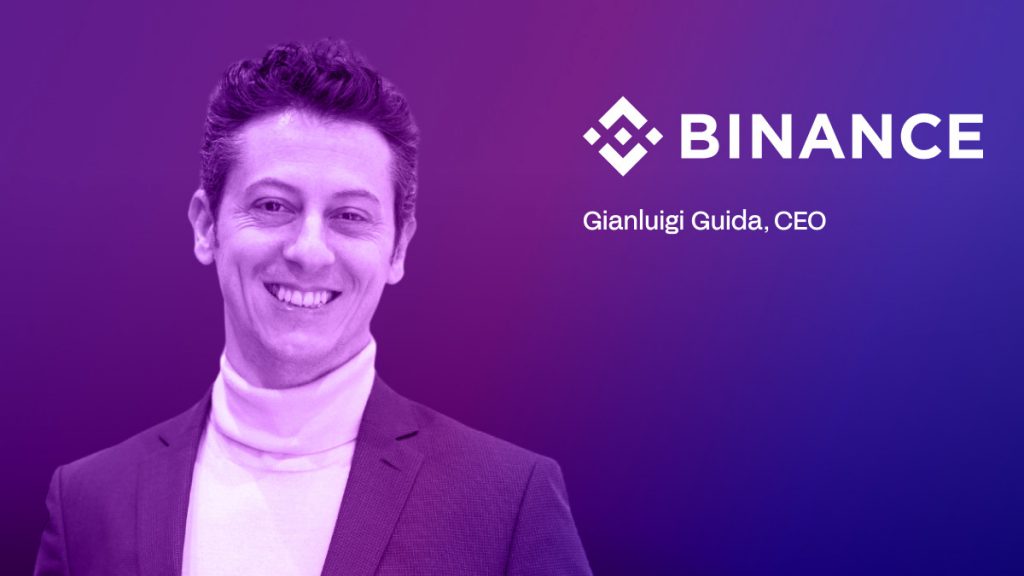Unlocking Italy’s Blockchain Potential: Binance Italy CEO Reveals Key Regions and Adoption Trends


In Brief
Gianluigi Guida, CEO of Binance Italy, discusses the adoption of cryptocurrency and blockchain in Italy, regulatory changes, AI integration, and navigating growth and compliance in the region.

In this insightful interview with Gianluigi Guida, CEO of Binance Italy, we will talk about the adoption of cryptocurrency and blockchain in Italy. Gianluigi shares his vision on regulatory changes, the integration of AI and blockchain, and how Binance is helping bridge traditional finance with emerging Web3 technologies. His perspective sheds light on Italy’s unique potential as a hub for innovation and how Binance is navigating both growth and compliance in the region.
Can you elaborate on the current state of crypto and blockchain adoption in Italy? What regions do you see as having the most potential in terms of growth?
Since the establishment of our company in 2022, we have consistently seen growth in adoption and user registrations in Italy. This is supported by recent data from the Politecnico di Milano research, which indicates that 3.6 million Italians are already using this technology, and the number is growing.
A recent study by Consob also showed that between 2022 and 2024, the percentage of respondents claiming to hold crypto assets in their portfolios rose from 8% to 18%. This demonstrates that people are becoming more interested in and understanding this technology better than before.
Regarding regions, it’s not easy to pinpoint specific areas. Due to population density, we see more users in regions like Lombardia and Lazio. Lombardia, being the Fintech Center, has various startups involved in this new technology. However, we’re also seeing startups in regions like Sardinia, Campania, and other parts of southern Italy. The adoption is well-spread across the country.
It’s worth noting that the rise of digital nomads is also contributing to Web3 adoption in regions like Sardinia and Sicily and that, thanks to remote working., new ideas can now grow anywhere in Italy, not just in the traditional tech hubs.
We’ve seen increasing attention to AI in Italy. Can you elaborate on the strategy for integrating blockchain with AI? What potential applications do you foresee in the near future?
AI is indeed all around us and gaining more interest daily. The intersection between AI and blockchain technology lies in their common focus on data. Blockchain technology secures, makes transparent, and renders data unmodifiable, while AI thrives on data. This creates fertile ground for the use of AI together with blockchain technologies.
We’re still at the beginning of this integration, and there’s much more to come. AI is becoming part of everything we do, and I expect these technologies will increasingly converge in interesting ways.
At Binance, we allow third parties to use AI in some of our products, such as AI trading bots, where users can let AI-driven bots make trading decisions on their behalf. We have partnerships with third-party companies offering these bots, and Binance also offers its own trading bots. In our operations, we use AI like any other innovative company, particularly in support of marketing activities and content creation.
How has Binance’s approach to regulatory compliance in Italy evolved since you took over as CEO? What specific measures have been implemented to address any regulatory concerns?
I joined Binance in September 2021 as a senior legal counsel covering Southern Europe. We established the company in Italy in March 2022 and obtained registration as a Virtual Asset Service Provider (VASP) with the OAM, the Italian Public Registry for VASPs, in May 2022. I initially took the role of general manager and then became CEO when we established our board of directors.
Compliance has been our guiding principle from day one. We’ve always operated in compliance with applicable rules, even when there were gray areas where the regulations weren’t clear. With the introduction of the MiCA regulation in Europe, things have become clearer.
We’ve implemented robust compliance measures, including AML and KYC procedures, to ensure we know our clients and their activities, just as in traditional finance. We’ve also built a team of professionals from traditional institutions like Morgan Stanley to strengthen our compliance efforts.
Additionally, we continue to work closely with both Italian and international authorities to ensure the protection of users’ funds and uphold the highest security standards. In 2023, focusing solely on Italy, the company addressed over 600 requests from law enforcement authorities.
How do you think the introduction of MiCA will impact the crypto market in Europe? Is it focused on certain countries or applicable to all EU member states?
We welcome MiCA very positively, as it offers more clarity than before. It’s crucial for businesses to know what they can and cannot do and to be able to evaluate operational risks. MiCA provides a unified framework that applies directly to all EU member states, which is very useful for operators like us.
Before MiCA, different countries had different rules, making it necessary to register separately in each country. Now, with MiCA, we can obtain one license and pass it to all European member states where we want to operate. This saves resources and allows us to focus better on markets.
Italy has shown openness to this technology. Regulators and authorities here understand the technology well, and there are experts in institutions like Consob and the Bank of Italy. The government is also open to innovation and startups, although progress can sometimes be slower than we’d like.
Can we expect the adoption of crypto by major banks in Italy? Do you think they will accept crypto as payment?
While we’d have to ask them directly, my opinion is that it’s now clear this technology is here to stay. I would be surprised if these banks hadn’t already established departments or teams to explore and implement these technologies to offer new services to their users. It’s a logical development for banks to provide these services alongside their traditional offerings.
With the approval of Bitcoin ETFs in the US, how does Binance anticipate this will impact the broader cryptocurrency market, especially in Europe?
The approval of Bitcoin and Ethereum ETFs is a significant step in the adoption of this new technology. I see ETFs as a bridge between traditional finance and the Decentralized Finance world. They allow people who may not be familiar with using crypto exchanges or wallets to indirectly invest in Bitcoin or Ethereum through a traditional financial instrument.
This development shows that the traditional finance world is getting closer to the crypto world. It’s an evolution, not a separate thing. The fact that many traditional players are buying Bitcoin or Ethereum and offering ETFs to their clients demonstrates that they understand the potential of this technology.
How do you see Binance’s role in bridging traditional Web2 and Web3? Do you have any specific plans?
Binance, as the leading exchange in the world, plays a crucial role in facilitating this transition. We offer various products that allow people to use this technology in a user-friendly way, which helps adoption. However, what helps most is education.
Binance is an ecosystem with different branches, including Binance Academy, which focuses on sharing knowledge about blockchain technology, helping users identify potential scams, and providing free educational content. In Italy, for example, we’ve partnered with Treccani, a traditional education company, to organize tours in different universities to educate students about this technology.
Our goal is to help people understand how they can benefit from this technology in their daily lives and improve their quality of life. We’re working hard in that direction, playing an important role in bridging the gap between traditional and new finance.
Can you share your roadmap for Binance Italy? Are there any specific initiatives planned for implementation in this region?
As part of a larger group, we localize many activities carried out at the global or central level. Currently, we’re at an important moment due to the introduction of MiCA, which requires us to develop a new strategy. While I can’t share many details about our strategy, I can tell you that we’re working on obtaining all necessary licenses to operate across Europe, including in Italy.
We have a strong team in Italy, and the company is well-established. Our focus right now is primarily on compliance, ensuring that we can continue to offer our products and services to users while adhering to all regulatory requirements. Once we’ve addressed these compliance issues, we’ll be able to focus more on product development and other initiatives specific to the Italian market.
Disclaimer
In line with the Trust Project guidelines, please note that the information provided on this page is not intended to be and should not be interpreted as legal, tax, investment, financial, or any other form of advice. It is important to only invest what you can afford to lose and to seek independent financial advice if you have any doubts. For further information, we suggest referring to the terms and conditions as well as the help and support pages provided by the issuer or advertiser. MetaversePost is committed to accurate, unbiased reporting, but market conditions are subject to change without notice.
About The Author
Victoria is a writer on a variety of technology topics including Web3.0, AI and cryptocurrencies. Her extensive experience allows her to write insightful articles for the wider audience.
More articles

Victoria is a writer on a variety of technology topics including Web3.0, AI and cryptocurrencies. Her extensive experience allows her to write insightful articles for the wider audience.


















































